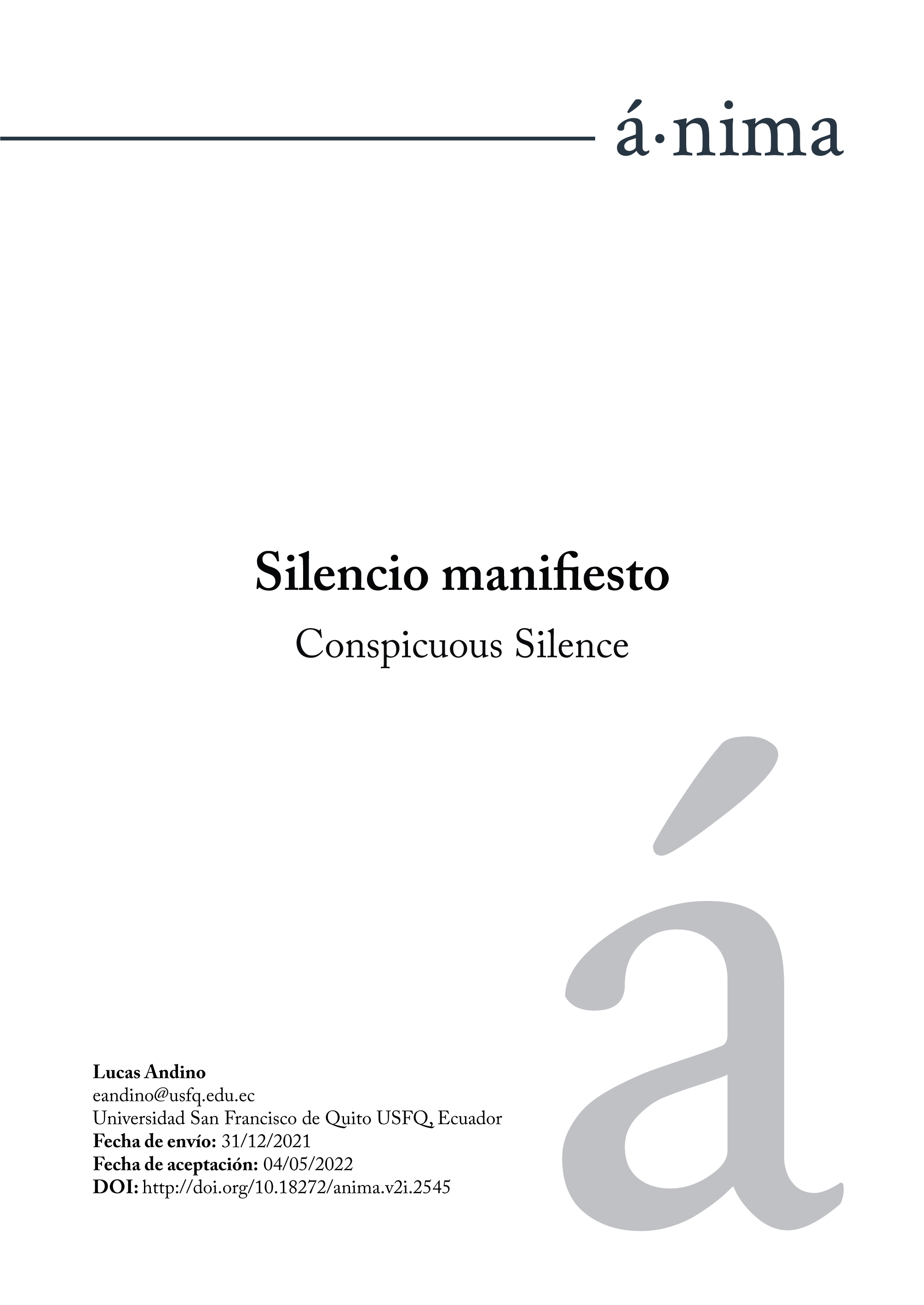español
DOI:
https://doi.org/10.18272/anima.v2i.2545Keywords:
silence, sigética, truth, poetry, Martin Heidegger, Hugo MujicaAbstract
This article is an effort to advance a philosophical concept of silence. Properly, this investigation does not present an object, it only delineates the field through which this object has the possibility of manifesting itself. Our "object" is silence. Through a discussion and revaluation of related concepts, silence is glimpsed here as that instance that allows an essential saying to occur, an expression that we could affirm is the closest to silence since it manages to amalgamate discourse and language, existentiality and intramundaneity. The reader will notice that the playing field outlined here is one that is based, mainly, on Heidegger and that takes examples from the poetic work of Hugo Mujica; It should be noted, however, that this is not a study on silence in the works of the German author and the Argentine author.
Downloads
References
Berg, Richard E., y David G. Stork. The Physics of Sound. Prentice Hall, 1995.
Burch, Matthew I. "The Existential Sources of Phenomenology: Heidegger on Formal Indication". European Journal of Philosophy, vol. 21, núm. 2, 2013, pp. 258-78. Wiley Online Library, https://doi.org/10.1111/j.1468-0378.2010.00446.x.
Crowell, Steven Galt. Husserl, Heidegger, and the Space of Meaning: Paths toward Transcendental Phenomenology. Northwestern University Press, 2001.
Dauenhauer, Bernard P. Silence: The Phenomenon and Its Ontological Significance. Indiana University Press, 1996.
Derrida, Jacques. "La estructura, el signo y el juego en el discurso de las ciencias humanas". La escritura y la diferencia, traducido por Patricio Peñalver, Anthropos, 2012, pp. 383-401.
Fehér, Istvan. "Phenomenology, Hermeneutics, Lebensphilosophie: Heidegger"™s Confrontation with Husserl, Dilthey, and Jaspers". Reading Heidegger from the Start: Essays in His Earliest Thought, editado por Theodore Kisiel y John Van Buren, State University of New York Press, 1994, pp. 73-89.
Heidegger, Martin. Aportes a la filosofía: Acerca del evento. Traducido por Dina Picotti, 2a ed., Biblos, 2006.
---. Carta sobre el Humanismo. Traducido por Helena Cortés y Arturo Leyte, Alianza Editorial, 2013.
---. "El final de la filosofía y la tarea del pensar". Tiempo y ser. Traducido por José Luis Molinuevo, Tecnos, 2003, pp. 77-93.
---. Ser y tiempo. Traducido por Jorge Eduardo Rivera, 2a ed., Trotta, 2016.
Herrmann, Friedrich-Wilhelm von. Hermeneutics and Reflection: Heidegger and Husserl on the Concept of Phenomenology. Traducido por Kenneth Maly, University of Toronto Press, 2013.
Kisiel, Theodore. "On the Operative Role of Occasion, Situation, and Context in Heidegger"™s Works". Western APA, 2008.
---. The Genesis of Heidegger"™s Being and Time. University of California Press, 2003.
Mujica, Hugo. Poesía completa: 1983-2004. Seix Barral, 2010.
Nelson, Eric. "Die formale Anzeige der Faktizität als Frage der Logik". Heidegger und die Logik, editado por Alfred Denker y Holger Zaborowski, Rodopi, 2006, pp. 49-64.
Sontag, Susan. "The Aesthetics of Silence". A Susan Sontag Reader, Farrar, Straus, Giroux, 2014, pp. 181-204.

Downloads
Published
How to Cite
Issue
Section
License
Los autores que publiquen en la revista aceptan los siguientes términos:
- Los autores conservarán sus derechos de autor y garantizarán a la revista el derecho de primera publicación de su obra, la cual estará simultáneamente sujeto a la Licencia de reconocimiento de Creative Commons que permite a terceros compartir la obra siempre que se indique su autor y su primera publicación esta revista.
- Los autores podrán adoptar otros acuerdos de licencia no exclusiva de distribución de la versión de la obra publicada, pudiendo de esa forma publicarla en un volumen monográfico o reproducirla de otras formas, siempre que se indique la publicación inicial en esta revista.
- Se permite y se recomienda a los autores difundir su obra a través de Internet:
- Antes del envío a la revista, los autores pueden depositar el manuscrito en archivos/repositorios de pre-publicaciones (preprint servers/repositories), incluyendo arXiv, bioRxiv, figshare, PeerJ Preprints, SSRN, entre otros, lo cual puede producir intercambios interesantes y aumentar las citas de la obra publicada (Véase El efecto del acceso abierto).
- Después del envío, se recomiendo que los autores depositen su artículo en su repositorio institucional, página web personal, o red social científica (como Zenodo, ResearchGate o Academia.edu).





